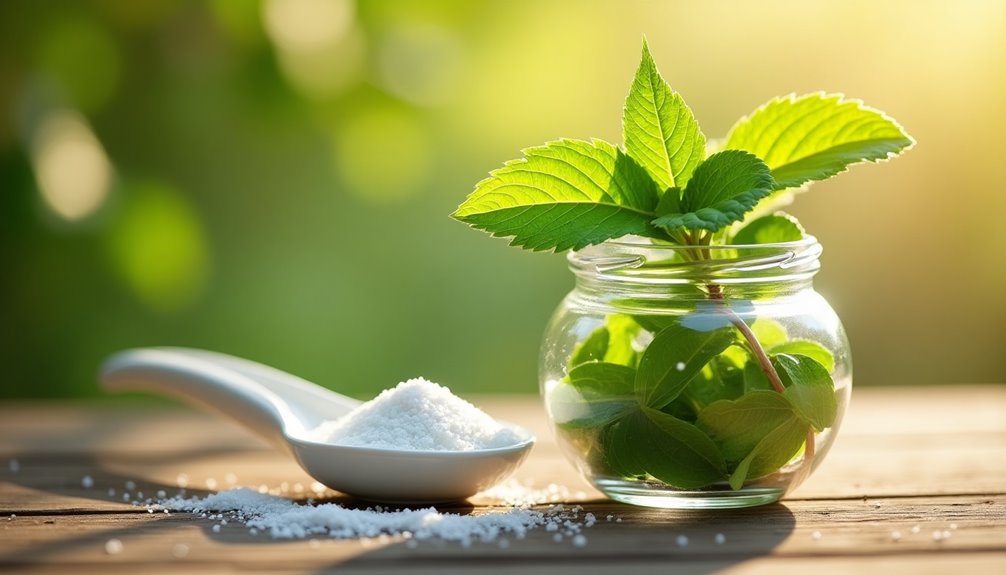Switching to stevia instead of sugar can be a smart choice for your health. This natural sweetener, derived from the Stevia rebaudiana plant, is up to 300 times sweeter than sugar but contains zero calories and has a zero glycemic index. It helps with weight management and can lower blood sugar levels. While adjusting recipes might require some experimentation, using less stevia than sugar is key. Keep in mind that its unique flavor and potential digestive discomfort might not suit everyone. Discovering various ways to incorporate stevia in your meals can enhance your cooking experience. There's much more to explore.
Key Takeaways
- Stevia is up to 300 times sweeter than sugar, so use less in recipes to achieve the desired sweetness.
- It contains zero calories and has a zero glycemic index, making it a healthier alternative for blood sugar control.
- Stevia's distinct flavor may not appeal to everyone, so consider taste testing before fully substituting it for sugar.
- When baking, adjust other ingredients accordingly, as stevia can alter the texture and moisture of the final product.
- Stevia pairs well with other sweeteners like honey and maple syrup, creating balanced sweetness in beverages and dishes.
What Is Stevia?
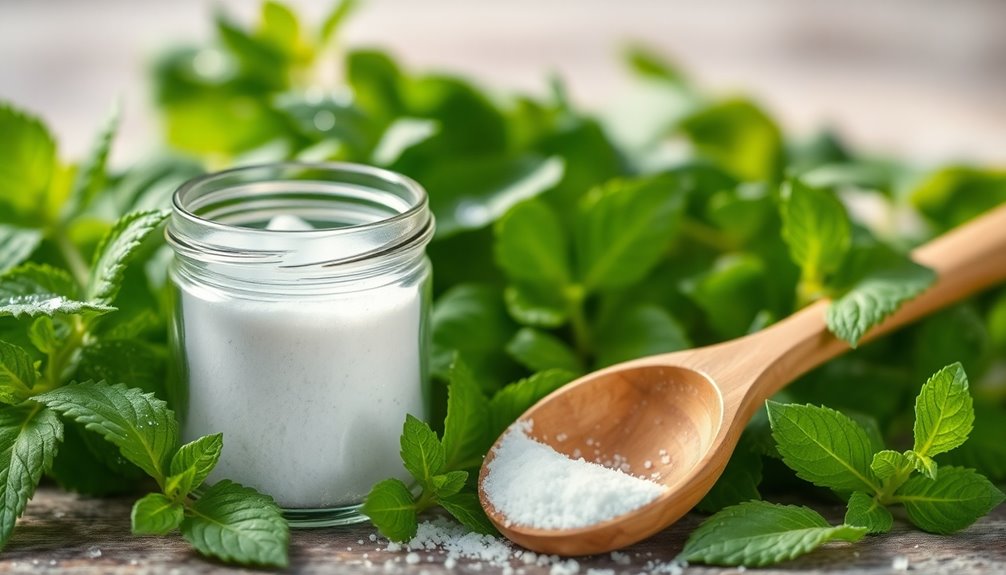
Many individuals are turning to stevia as a natural substitute for sugar. Derived from the leaves of the Stevia rebaudiana plant, stevia is recognized for its intense sweetness—up to 300 times sweeter than sugar—without the calories. This plant has a long history of use, especially in South America, where it has been cultivated for centuries.
As you explore stevia alternatives, you'll discover that this sweetener not only provides a unique flavor profile but also aligns with the increasing trend toward healthier eating.
Stevia cultivation requires specific conditions, such as well-drained soil and abundant sunlight, making it suitable for home gardens or larger agricultural operations. Many farmers are now embracing stevia, acknowledging its potential to thrive in various climates and its increasing market demand.
As the popularity of stevia grows, you may observe a rising number of products showcasing this sweetener in stores, from beverages to baked goods.
When contemplating stevia, understanding that while it can substitute sugar in different recipes, it behaves differently in cooking and baking is crucial. For example, it doesn't caramelize like sugar does, which can impact the texture and flavor of your preferred treats.
Health Benefits of Stevia
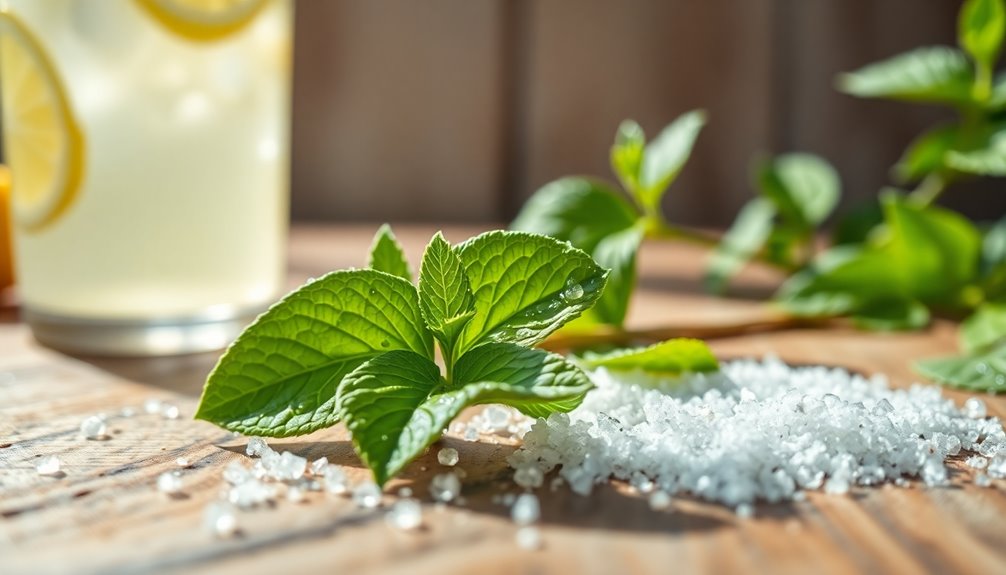
When you consider the health benefits of stevia, its appeal extends far beyond its sweetness. This natural sweetener offers several advantages that make it a compelling choice for many. One notable benefit is its potential role in weight management. Unlike sugar, stevia is calorie-free, meaning you can enjoy your favorite treats without worrying about extra calories creeping into your diet. This can be particularly helpful if you're trying to lose weight or maintain a healthy lifestyle.
Another significant advantage of stevia is its impact on blood sugar control. Research suggests that stevia may help lower blood sugar levels, making it a suitable option for those managing diabetes or anyone concerned about their glucose levels. Unlike sugar, which can cause spikes and crashes in blood sugar, stevia provides a steady sweetness without the negative effects on your insulin response.
Additionally, using stevia can foster a sense of belonging within health-focused communities. Many people are becoming increasingly aware of the importance of making healthier choices, and opting for stevia can be a great way to align with those values. By choosing stevia over sugar, you're not just making a personal health decision; you're also joining a larger movement toward better nutrition.
Stevia vs. Sugar: A Comparison
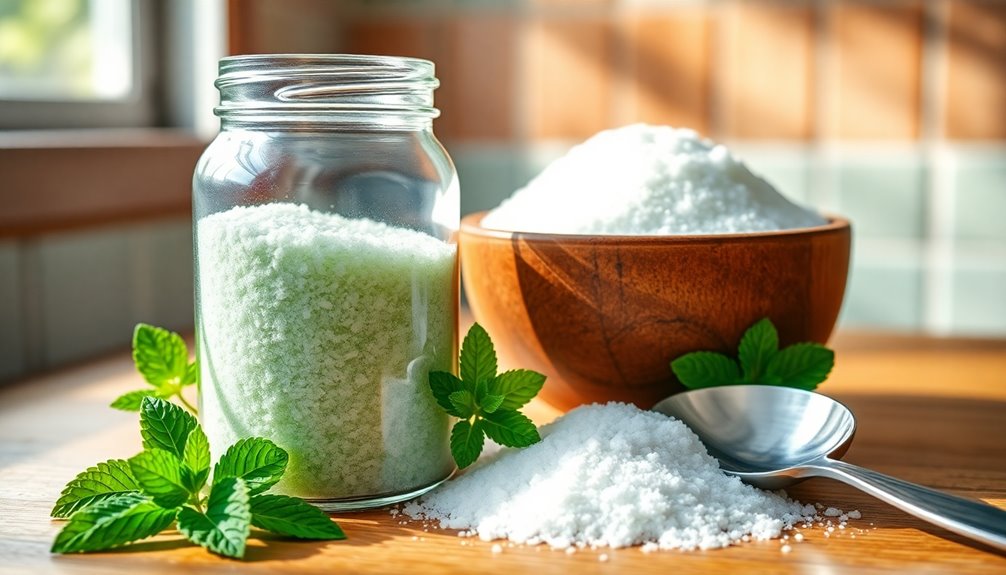
In the debate between stevia and sugar, understanding their differences is essential for making informed dietary choices. Both sweeteners have unique characteristics that can influence your decision.
When it comes to taste comparison, many find stevia to have a slightly bitter aftertaste, while sugar provides a familiar sweetness that most people love. Nutritional differences also play a significant role; stevia is calorie-free and doesn't raise blood sugar levels, whereas sugar adds calories and can lead to spikes in insulin.
Here are some key points to take into account:
- Caloric Content: Stevia has zero calories, while sugar contains about 16 calories per teaspoon.
- Glycemic Index: Stevia's glycemic index is zero, making it suitable for diabetics, unlike sugar which has a high glycemic index.
- Cost Comparison: Stevia can be more expensive per serving than sugar, but you use much less due to its potency.
- Availability Concerns: Sugar is widely available and found in most foods, while stevia may not be as easily accessible in all regions.
- Usage Versatility: Sugar is often preferred in baking for its texture, while stevia can be tricky in recipes requiring bulk.
Ultimately, your choice between stevia and sugar should reflect your health goals and taste preferences. By weighing these factors, you can find the sweetener that best fits your lifestyle and dietary needs.
How to Use Stevia
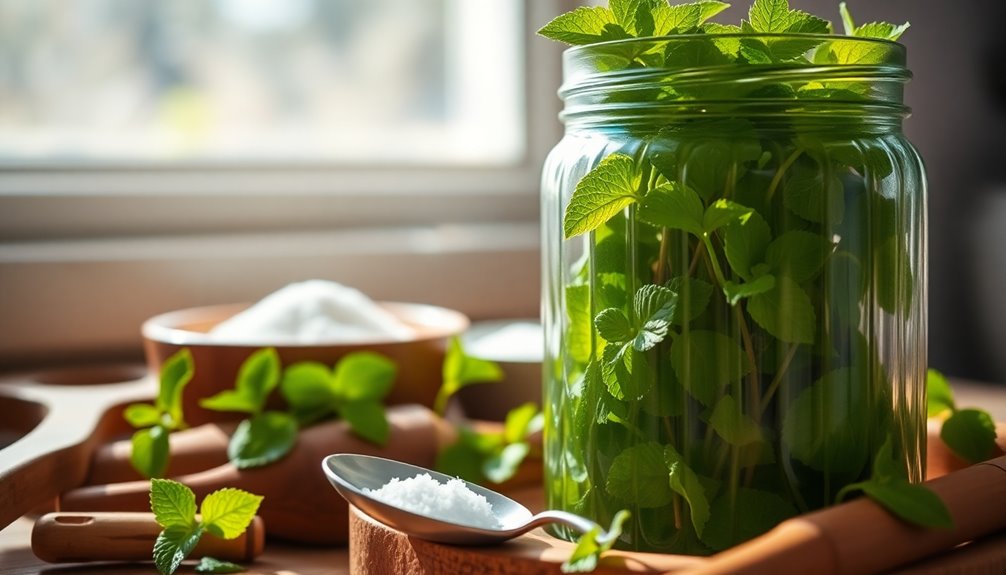
Stevia's versatility makes it a fantastic alternative to sugar in various recipes and beverages. If you're looking to reduce sugar in your diet, incorporating stevia is easier than you might think.
When baking with stevia, remember that it's much sweeter than sugar, so you'll need to adjust the quantity. A general guideline is to use about one teaspoon of liquid stevia for every cup of sugar replaced. For dry stevia, check the product's conversion chart, as different brands may vary in sweetness levels.
When it comes to coffee with stevia, you can enjoy a naturally sweetened cup without the calories. Start by adding a few drops of liquid stevia or a small scoop of powdered stevia to your brew. Stir well and taste; you can always add more if needed. This sweetener blends well, so you won't have to worry about any gritty texture.
Keep in mind that stevia can sometimes have a slightly different aftertaste compared to sugar. Experimenting with it in different recipes will help you find the right balance for your palate.
Whether you're sweetening a morning beverage or whipping up a delicious dessert, stevia can seamlessly fit into your lifestyle. By embracing this sugar alternative, you not only enhance your dishes but also make a positive change for your health. So go ahead, explore the world of stevia, and enjoy the benefits it brings to your culinary creations!
Potential Drawbacks of Stevia
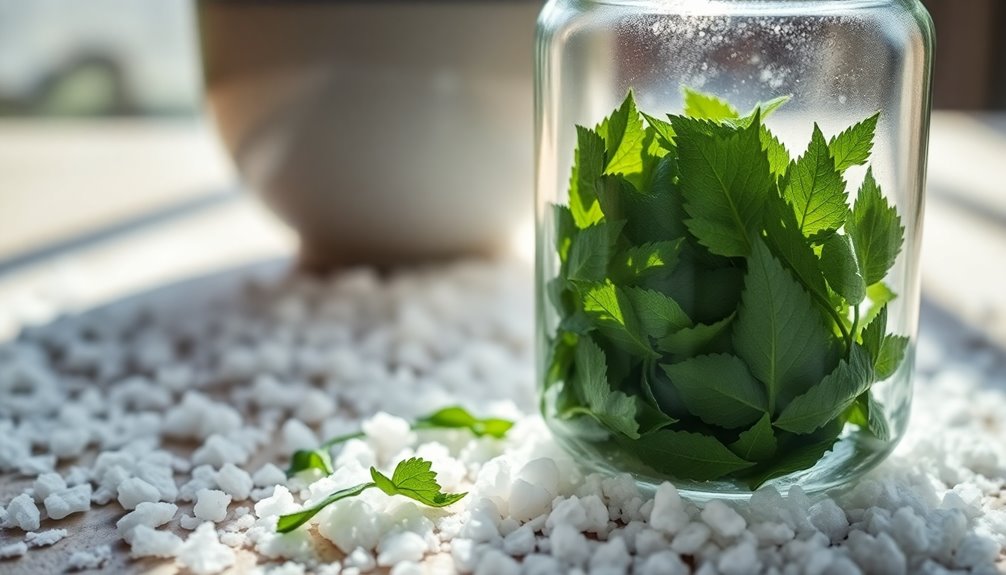
While many individuals enjoy stevia as a sugar replacement, it's crucial to take into consideration some possible drawbacks. For some, shifting to stevia mightn't be as seamless as they'd anticipated. Here are some factors you should consider:
- Taste preferences: Stevia possesses a distinct flavor that some individuals find acrid or excessively sweet compared to sugar. If you're accustomed to conventional sweeteners, the shift might be demanding.
- Digestive issues: Some people report encountering digestive discomfort when using stevia, including bloating or gas. Your body may react differently, so it's prudent to monitor how you feel after using it.
- Aftertaste: Many users observe a lingering aftertaste with stevia, which may not be agreeable to everyone. This can impact your overall enjoyment of food and drinks.
- Overconsumption: Simply because it's a zero-calorie sweetener doesn't mean you won't overindulge. It's simple to lose track of your consumption, leading to potential digestive issues.
- Lack of versatility: While stevia works effectively in some recipes, it may not perform as effectively in others that depend on sugar's characteristics, such as caramelization.
Before fully embracing stevia, reflect on these potential drawbacks. Each person's body reacts uniquely, and what suits one individual may not suit you. Being knowledgeable assists you in making the optimal choices for your health and taste preferences.
Recipes Using Stevia
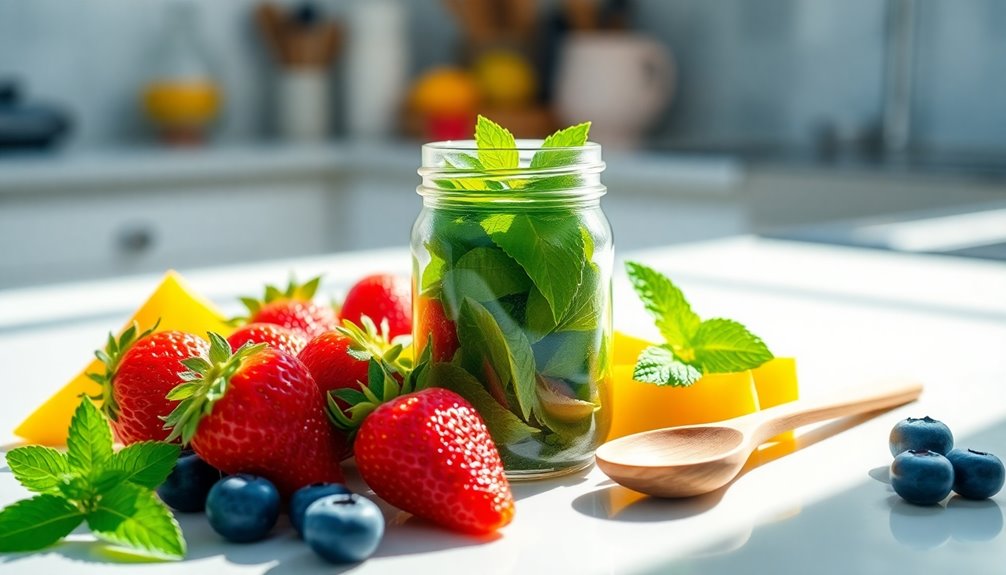
Using stevia in your recipes can be a fantastic way to reduce sugar intake without sacrificing sweetness. Whether you're baking or cooking, you'll find that stevia can serve as an excellent sugar alternative. When experimenting with baking substitutes, remember that stevia is much sweeter than sugar, so you'll need less of it.
A general rule of thumb is to use one teaspoon of stevia for every cup of sugar.
When you're making cookies or cakes, consider incorporating stevia into your batter. For example, if your favorite chocolate chip cookie recipe calls for one cup of sugar, replace it with just a teaspoon of stevia. You might also want to add a bit of vanilla extract for depth of flavor, as stevia can sometimes have a slight aftertaste.
Other sweetener options, like honey or maple syrup, can be combined with stevia for a unique twist in your recipes. For instance, in a homemade salad dressing, you can use stevia along with a splash of balsamic vinegar and olive oil to create a delightful balance of flavors.
Don't forget about beverages, too! You can sweeten your iced tea or smoothies with stevia instead of traditional sugars. Try adding stevia to your morning oatmeal or yogurt for a nutritious start to your day.
Frequently Asked Questions
Is Stevia Safe for Children and Pregnant Women?
You might wonder about stevia safety during pregnancy and stevia consumption in children. Research suggests stevia is generally safe for both groups when consumed in moderation. It's a natural sweetener with minimal calories, making it a popular choice.
However, it's important to consult with a healthcare professional before introducing it into your diet, especially during pregnancy or for young children, to confirm it fits well with your overall health and nutrition needs.
Can Stevia Affect Blood Sugar Levels?
You might wonder if stevia truly impacts blood sugar levels. Research indicates that stevia doesn't raise insulin levels, making it a favorable option for those managing diabetes.
In fact, studies show stevia can help with diabetes control by providing sweetness without the calorie load of sugar. This means you can enjoy a sweet taste without worrying about spikes in blood sugar, fostering a sense of belonging to a healthier lifestyle.
Does Stevia Have Any Known Side Effects?
Stevia may cause side effects in some individuals, though it's generally considered safe. Some people report allergies, experiencing symptoms like rashes or difficulty breathing. If you're sensitive, it's wise to monitor your reaction.
Additionally, stevia can affect digestion for some, leading to bloating or gas. It's important to listen to your body and consult a healthcare professional if you experience persistent issues. Knowing your limits helps you enjoy stevia safely.
How Does Stevia Taste Compared to Sugar?
When you're exploring taste comparison, you'll notice some flavor differences between stevia and sugar. Stevia is often described as having a sweet, slightly herbal aftertaste, while sugar offers a clean, straightforward sweetness. Many people find sugar more palatable for baking and cooking, as it enhances flavors without competing.
It's crucial to experiment and find what works for your palate, as preferences can vary widely based on individual taste experiences.
Is Stevia Suitable for Baking and Cooking?
Did you know that around 70% of people are seeking healthier sweetening options in their cooking? Stevia can be a great choice for baking alternatives, but understanding that it behaves differently than sugar is crucial.
In culinary applications, you might need to adjust the measurements or combine it with other sweeteners to achieve the desired texture and flavor. Embracing stevia could enhance your cooking experience while promoting a healthier lifestyle.
Conclusion
Incorporating stevia instead of sugar into your diet can lead to significant health benefits, notably for those managing weight or blood sugar levels. Research shows that stevia can be up to 300 times sweeter than sugar, enabling you to use much less for the same sweetness. While being mindful of potential drawbacks, stevia offers a natural, calorie-free alternative that can enhance your favorite recipes without compromising your health goals.

